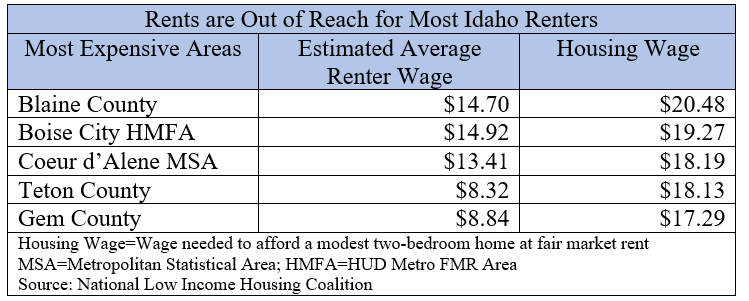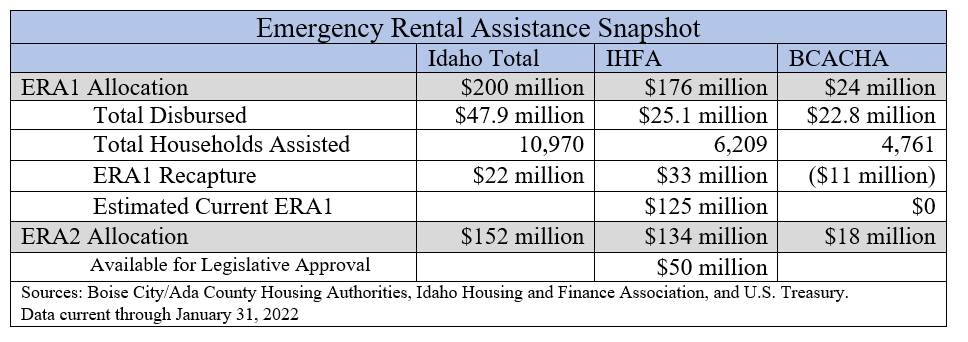In response to the COVID-19 pandemic, Congress in recent years moved to prevent evictions by approving two rounds of emergency rental assistance in two separate coronavirus relief packages. Idaho lawmakers should take a few steps, detailed below, to ensure Idahoans receive the maximum benefit from this assistance.
Rising Rents Remain Out of Reach for Most Idaho Renters
A home is affordable when a household pays no more than 30 percent of its income on rent. An analysis conducted by the National Low Income Housing Coalition found that an Idaho renter must earn at least $17.36 per hour to afford a modest two-bedroom home at fair market rent, but the average Idaho renter only earns $13.62.1 Families paying more than they can afford in rent often struggle to afford other basic necessities – such as nutritious food, important healthcare appointments and medications, daycare, and fuel for their commute.
Housing and Financial Hardship are Still Widespread
Idaho renters with modest incomes continue to experience housing and financial hardship as a result of rapidly increasing rents, a shortage of over 22,000 affordable and available homes, and ongoing struggles from pandemic-related income loss. This hardship has been documented by the U.S. Census Bureau’s Household Pulse survey. The table below illustrates the disparity between renters’ average wages in Idaho’s most expensive areas and a wage that would allow them to afford housing without a cost burden.

At the end of 2021:
- 271,000 Idaho households were struggling to cover usual household expenses
- 21,000 Idaho renter households were not caught up on rent
- 35,000 Idaho households with children reported that children in the household weren’t eating enough because they couldn’t afford food.2
Even prior to the pandemic, more than 22,000 Idaho renters earning 30 percent of area median income and below were paying more than they could afford in rent.3
Emergency Rental Assistance is Time-Limited to 2025
Congress enacted the first round of emergency rental assistance – known as ERA1 – in December 2020 as part of the Consolidated Appropriations Act of 2021. ERA1 expires in September 2022. The second round – known as ERA2 – was enacted in March 2021 as part of the American Rescue Plan Act. It expires September 2025. Both rounds of funding have been used to tackle housing instability and homelessness through programs administered by state and local programs.
- The Idaho Housing and Finance Association (IHFA) administers the state’s ERA allocations through the Housing Preservation Program.
- The Boise City/Ada County Housing Authorities (BCACHA) administer the city of Boise and Ada County’s allocations through the Emergency Rental Assistance Program.
ERA Flexibility Ensures Statewide Program Effectiveness
The need for emergency rental assistance in Boise and Ada County has remained high, and BCACHA have exhausted their allocation of ERA1 funds. The Idaho Legislature’s authorization of ERA1 funds in 2021 did not allow for the transfer of ERA1 funds to local programs when the need arose. As a result of IHFA’s relatively low utilization rate, the federal government recaptured $22 million of the state’s funding and sent it to programs out of the state despite the need for additional funding to BCACHA.
The Added Advantages of ERA2
Although similar in many ways, ERA1 and ERA2 have important differences that necessitate legislative approval for both rounds of funding. By design, ERA2 is more capable of addressing the unique needs of Idaho renters because:
- ERA2 would be available to Idahoans through September 2025 – three years after ERA1 expires in September 2022.
- ERA2 allows families to access up to three more months of assistance for a total of 18 months. Many families receiving assistance from ERA1 funds have already hit the 15-month cap and cannot receive additional assistance until ERA2 is approved.
- ERA2 removes bureaucratic red tape and increases program effectiveness by expanding eligibility to renters experiencing financial hardship during the COVID-19 pandemic.
Emergency Rental Assistance Helps Prevent Evictions in Idaho
To date, emergency rental assistance funding has provided almost 11,000 Idaho families with the financial assistance they needed to remain safely housed in a stable situation. The federal relief packages appropriated a total of $200 million in ERA1 funds and $152 million in ERA2 funds to the state of Idaho. However, local governments with populations exceeding 200,000 had the option to receive a portion of the state’s full allocation to administer at the local level. Both Ada County and the City of Boise chose to receive a direct allocation, adjusting the state’s final allocations to about $176 million in ERA1 funds and $134 million in ERA2 funds. The table below contains a breakdown of the distribution of both rounds of ERA in Idaho.

Policy Recommendations
Lawmakers can optimize the effectiveness and reach of the state’s ERA programs by approving the funds included in the Division of Financial Management’s Fiscal Year 23 budget. This appropriation ensures funds will be used to help Idaho renters stay safely housed as they experience financial hardship. The appropriation also confirms those funds will not be reallocated to out-of-state programs, because it allows for in-state transfers of ERA1 and ERA2 funds when local funding is exhausted.
1National Low Income Housing Coalition, “2021 Out of Reach Report – Idaho Factsheet.” Summer 2021. Accessed at: https://reports.nlihc.org/sites/default/files/oor/files/reports/state/id-2021-oor.pdf
2Center on Budget and Policy Priorities, “Tracking the COVID-19 Economy’s Effects on Food, Housing, and Employment Hardships. Winter 2021. Accessed at: https://www.cbpp.org/sites/default/files/8-13-20pov.pdf
3National Low Income Housing Coalition, “2021 Gap Report.” March 2021. Accessed at: https://reports.nlihc.org/sites/default/files/gap/Gap-Report_2021.pdf


